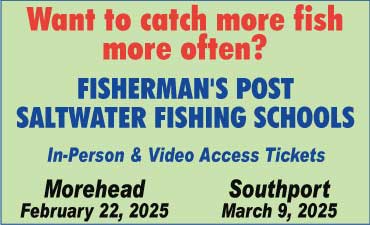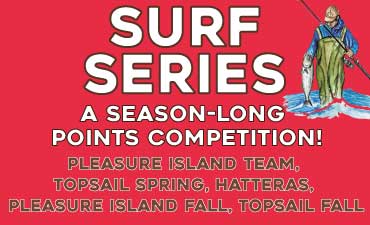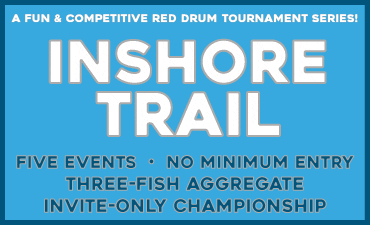Releases – March 27, 2014
Seaview Pier will be holding a multi-species, season-long tournament to benefit Military Appreciation Day, Inc. (MAD) over the spring, summer, and fall of 2014. The event features competition for 10 species commonly caught from the North Topsail Beach pier’s planks, and entrants are automatically registered for all the categories—sea mullet, flounder, bluefish, pompano, king mackerel, spanish mackerel, speckled trout, cobia, black sea bass, and black drum.
The event runs April 1-October 25, 2014, with a grand prize drawing and non-winners’ drawing at the close of the competition. A $30 entry fee gets participants into all the categories, with $10 of that going directly to MAD’s efforts to take members of our military fishing.
Check out the Seaview Fishing Pier Facebook page for more details or call the pierhouse at (910) 328-3172.
On March 6, 2014, the North Carolina Fisheries Association and the Carteret County Fisherman’s Association (Plaintiffs) filed a Notice of Intent (NOI) to sue various state and federal resource agencies under the Endangered Species Act (ESA) for failure to adequately regulate both recreational, hook-and-line fishermen and boaters who may incidentally take protected sea turtles in North Carolina while fishing or boating.
The ESA requires that agencies responsible for administering its protections receive 60-day notice of alleged problems under the statute before actual litigation can ensue. In its NOI the prospective Plaintiffs ask state and federal resource agencies for either an in-water stock assessment for all protected species of sea turtles to determine whether management restrictions on fishermen remain warranted under the ESA, or alternatively, request that those resource agencies impose on recreational fishermen and boaters management restrictions that are, in Plaintiff’s eyes, equivalent to those currently in place for commercial fishermen until sea turtle populations are declared fully recovered.
The Plaintiffs’ NOI significantly mischaracterizes the relative threat of recreational marine resource users to the conservation and recovery of protected sea turtles as compared to the documented threat to conservation and recovery presented by commercial gear users. While Plaintiffs imply that state hook-and-line fishermen accounted for 45 percent of sea turtle interactions according to 2013 North Carolina Sea Turtle Strandings and Salvage Network (STSSN) information, the actual STSSN data show that state recreational fishermen accounted for no more than 25 percent of fishing gear interactions with sea turtles and 4 percent of gear-caused sea turtle fatalities.
Moreover, because STSSN data are largely self-reported, they are not representative of state sea turtle strandings as a whole, and they exclude sea turtle interactions in the shrimp trawl and commercial long line fisheries; the vast majority of sea turtle deaths caused by hook-and-line interactions occur in the latter fishery.
Additionally, while Plaintiffs make vague, unsupported allegations in the NOI of the underreporting of sea turtle interactions by recreational fishermen, the North Carolina Division of Marine Fisheries’ (DMF) 2013 observer data for the gillnet fishery ITP indicate that-if DMF’s observer program is representative of the gillnet fishery as a whole, it is statistically probable that commercial gillnetters should have reported some 600 sea turtle interactions for gillnet trips not being observed during 2013; yet in actuality they reported only 1 such interaction, even though the gillnet ITP strictly mandates self-reporting.
Coastal Conservation Association North Carolina (CCA-NC) has always been, and remains, committed to the conservation and recovery of protected sea turtles in North Carolina. That commitment was evidenced last year both by recreational gear recommendations CCA-NC made to the North Carolina Marine Fisheries Commission pertaining to the use of circle hooks in some recreational fisheries, and by CCA-NC’s vigorous participation in the statewide gillnet and Atlantic sturgeon Incidental Take Permit processes.
CCA-NC is also committed to fairness in implementing the mandate of the ESA, including fairness to commercial fishermen. That commitment to fairness can never mean, however, that this organization accedes to the widespread use of non-selective commercial gears that by their very nature pose a continuing threat both to sea turtles and state finfish stocks.
CCA-NC is closely monitoring this proposed lawsuit on behalf both of its members and the millions of other citizens who would be adversely affected by imposition of the unwarranted remedies Plaintiffs seek in this case, as set out in the NOI. CCA-NC is committed to taking whatever steps are necessary to safeguard those interests as this lawsuit proceeds.
NOAA Fisheries is seeking public comment on Amendment 5 to the Fishery Management Plan for the Dolphin and Wahoo Fishery of the Atlantic (Dolphin Wahoo Amendment 5). The notice of availability for Dolphin Wahoo Amendment 5 published on February 28, 2014 (79 FR 11383), with a comment period ending on April 29, 2014.
Dolphin Wahoo Amendment 5 would increase the annual catch limits for dolphin and wahoo. The increase is based on updates to the recreational data for these species, as per the new Marine Recreational Information Program, as well as revisions to commercial and for-hire landings. The Marine Recreational Information Program replaced the Marine Recreational Fisheries Statistics Survey.
Additionally, Dolphin Wahoo Amendment 5 would modify the accountability measures and update the framework procedure for dolphin and wahoo.
Comments on the notice of availability must be received no later than April 29, 2014, to be considered by NOAA Fisheries.
Electronic or hardcopies of the amendment may be obtained from the NOAA Fisheries website and/or the South Atlantic Fishery Management Council’s website.
You may submit comments by the following methods:
(1) Submit all electronic public comments via the Federal e-Rulemaking Portal. Go to www.regulations.gov/#!docketDetail;D=NOAA-NMFS-2013-0170, click the “Comment Now!” icon, complete the required fields, and enter or attach your comments.
(2) Submit print comments via mail: Nikhil Mehta, NOAA Fisheries Southeast Regional Office, Sustainable Fisheries Division, 263 13th Avenue South, St. Petersburg, FL 33701-5505.
All comments received are a part of the public record and will generally be posted for public viewing on www.regulations.gov without change. All personal identifying information (e.g., name, address, etc.), confidential business information, or otherwise sensitive information submitted voluntarily by the sender will be publicly accessible. NMFS will accept anonymous comments (enter “N/A” in the required fields if you wish to remain anonymous). Attachments to electronic comments will be accepted in Microsoft Word, Excel, or Adobe PDF file formats only.
For more information on Dolphin Wahoo Amendment 5, please follow this link to the Frequently Asked Questions: http://sero.nmfs.noaa.gov/sustainable_fisheries/s_atl/dw/2013/am5/index.html.
Earlier this year, the U.S. House of Representatives’ Natural Resources Committee held the first Congressional hearing on a draft bill reauthorizing the Magnuson-Stevens Fishery Conservation and Management Act, the legislation that governs federal saltwater fisheries management. Of keen interest to the saltwater recreational fishing community regarding the Magnuson-Stevens Act reauthorization process is the opportunity to finally address the historic lack of attention the federal fisheries management system has paid to recreational fishing.
The American Sportfishing Association (ASA) is pleased that Congress is exploring legislative changes to this important law and will provide input throughout the reauthorization process to ensure enhanced fisheries conservation while upholding recreational fishing’s economic, social, and conservation benefits.
“In recent years, under the Magnuson-Stevens Act, tremendous progress has been made toward rebuilding marine fisheries and regulating commercial fisheries harvest sustainably,” said ASA President and CEO Mike Nussman. “However, since the original passage of the Magnuson-Stevens Act in 1976, recreational fishing has been an afterthought in federal fisheries management.”
Nussman further said, “Our nation’s 11 million saltwater anglers have a $70 billion economic impact each year, supporting 454,000 jobs. Reauthorizing the Magnuson-Stevens Act is an opportunity to develop a management system that conserves fishery resources, provides consistency in regulations and produces the full range of saltwater recreational fishing’s economic, social and conservation benefits for the nation.”
In 2013, several hearings were held in both the Senate and House of Representatives to provide legislators with various perspectives on federal fisheries management and needed changes. Last December, House Natural Resources Committee Chairman Doc Hastings (R-Wash.) released a “Discussion Draft” of a Magnuson-Stevens Act reauthorization bill. Senator Mark Begich (D-Alaska), Chairman of the Senate Commerce Subcommittee on Oceans, Atmosphere, Fisheries, and Coast Guard, recently stated that he intends to release a draft Magnuson-Stevens Act reauthorization bill in March.
“Chairman Hasting’s draft Magnuson-Stevens Act reauthorization bill contains some provisions that we support, and others that give us cause for concern,” said Mike Leonard, ASA’s Ocean Resource Policy director. “This is often the case with such significant and complicated legislation, particularly at this relatively early stage of the legislative process.”
Leonard also pointed out that several key priorities of the recreational fishing community are not addressed in Chairman Hasting’s draft legislation, including establishing a national policy for recreational fishing, adopting a revised approach to saltwater recreational fisheries management, and formalizing a process for examining allocations of mixed-use fisheries.
Leonard concluded, “We look forward to working with Chairman Hastings, other members of the House Natural Resources Committee, and their colleagues in the Senate to incorporate the recreational fishing community’s priorities for MSA reauthorization as this process moves forward.”





